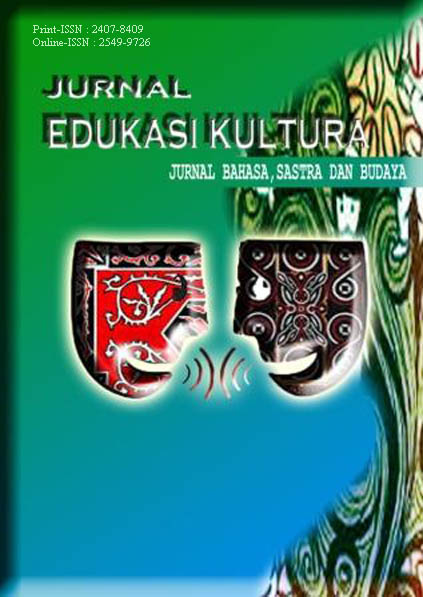PENGARUH PENDEKATAN KONTEKSTUAL TERHADAP PEMAHAMAN KECEPATAN DAN DEBIT DI SEKOLAH DASAR
Abstract
This study aims to evaluate the effectiveness of the contextual teaching and learning (CTL) approach in enhancing elementary school students’ understanding of the mathematical concepts of speed and flow rate. Using a literature review method, the researchers analyzed various relevant academic sources and found that the contextual approach effectively connects subject matter with students’ real-life experiences, making learning more meaningful, applicable, and enjoyable. The findings indicate that CTL not only improves conceptual understanding but also fosters the development of critical thinking skills, collaboration, and learning motivation. Therefore, this approach is recommended as an effective and adaptive instructional strategy to improve the quality of mathematics education in elementary schools, particularly in topics related to speed and flow rate.References
Ani, A., Maulana, M., & Sunaengsih, C. (2017). Pengaruh pendekatan kontekstual berbasis kecerdasan visual-spasial terhadap kemampuan pemahaman matematis siswa sekolah dasar. Jurnal Pena Ilmiah , 2(1), 971-980.
Bastian, A., & Reswita. (2022). Model dan pendekatan pembelajaran. Indramayu: Penerbit Adab. ISBN: 978-623-497-024-1.
Ester, K., Sakka, F., Mamonto, F., Mangolo, A., Bawole, R., & Mamonto, S. (2023). Model Pembelajaran Contextual Teaching and Learning (CTL) di SD Gmim II Sarongsong. Jurnal Ilmiah Wahana Pendidikan, 9(20), 967-973.
Handayani, H. (2015). Pengaruh pembelajaran kontekstual terhadap kemampuan pemahaman dan representasi matematis siswa sekolah dasar. Didaktik: Jurnal Pendidikan Guru Sekolah Dasar, I(1), 142-149.
Mazrur. (2021). Contextual Teaching And Learning Dan Gaya Belajar, Implikasi Pada Hasil Belajar Mata Pelajaran Fikih. Bekasi: CV. Media Edukasi Indonesia.
Nur, Z.T. (2019). Pengaruh Pendekatan Pembelajaran Kontekstual terhadap Hasil Belajar Matematika Siswa Kelas VIII SMPIT Aziziyyah Pekanbaru. Skripsi, University Islam Riau.
Sulastri, A. (2016). Penerapan pendekatan kontekstual dalam pembelajaran matematika untuk meningkatkan pemahaman konsep matematis siswa sekolah dasar. Jurnal Pendidikan Guru Sekolah Dasar, I(I), 156-170.
Widyasari, N., Hayyun, M. (2017). Pengembangan Pembelajaran Matematika SD. Jakarta: Fakultas Ilmu Pendidikan Universitas Muhammadiyah Jakarta.
Yolanda, A., Sihotang, M., Zebua, J. A., Hutasoit, M., & Sinaga, Y. L. (2024). Strategi pembelajaran kontekstual untuk meningkatkan pemahaman konsep siswa sekolah dasar. Pragmatik: Jurnal Rumpun Ilmu Bahasa dan Pendidikan, 2(3), 301-308.
Yuliani, A. F., Cahyadi, F., & Saputro, B. A. (2021). Analisis Learning Obstacle Materi Kecepatan dan Debit Pada Pembelajaran Daring Sekolah Dasar. Jurnal Didaktis Indonesia, 1(1), 49-62.
Published
How to Cite
Issue
Section
License
Copyright (c) 2025 Aulia Dea Ananda, Munisa Putri, Niko Alriadi Sinaga, Syahrial Syahrial, Doni Irawan Saragih

This work is licensed under a Creative Commons Attribution 4.0 International License.

This work is licensed under a Creative Commons Attribution 4.0 International License
Authors who publish with this journal agree to the following terms:
- Authors retain copyright and grant the journal right of first publication with the work simultaneously licensed under Creative Commons Attribution 4.0 International License that allows others to share the work with an acknowledgement of the work's authorship and initial publication in this journal.
- Authors are able to enter into separate, additional contractual arrangements for the non-exclusive distribution of the journal's published version of the work (e.g., post it to an institutional repository or publish it in a book), with an acknowledgement of its initial publication in this journal.Penulis.
- Authors are permitted and encouraged to post their work online (e.g., in institutional repositories or on their website) prior to and during the submission process, as it can lead to productive exchanges, as well as earlier and greater citation of published work (Refer to The Effect of Open Access).



